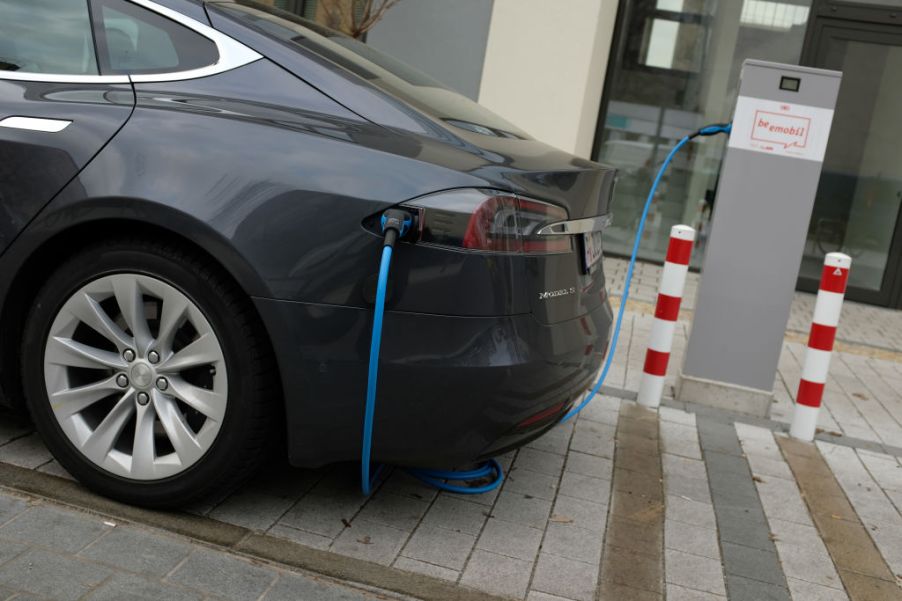
Which Electric Cars Get the Best Mileage in 2019?
Electric cars are quietly catching on. It’s easy to spot a best-selling EV like a Chevy Bolt or a Tesla Model 3 on the street these days. As a result, automakers are investing more in EVs. It helps that batteries have become more affordable and technologically advanced.
Consumers continue to grow more comfortable with these cars too. In the recent past, one of the biggest objections to electric vehicles used to be the limited driving range, which historically has been shorter than those of gas-powered vehicles.
Range anxiety seems to be gradually becoming a thing of the past. Most electric cars can travel at least 100 miles on a charge. Some have a range as much as 200 to 300 miles or more.
This year, five carmakers are selling EVs that have more than 200 miles of driving range on one charge, according to Consumer Reports. By the close of 2020, eight more EVs with this kind of range will be on the market.
But like a gas-powered car, an electric car’s driving range is dynamic and depends on how the energy used to power the car is expended. The number of miles an EV can travel on a charge is affected by several factors. These include a few that may seem counterintuitive to drivers used to internal combustion engines.
Factors that affect an electric car’s driving range
Temperature plays a key role in decreasing an EV’s driving range. In cold weather, energy from the battery is used to run the car’s heater. A gas-powered car, in contrast, uses some of the heat that is a by-product of the running engine to warm the cabin. To a lesser extent, running an EV’s air conditioning during hot weather also takes energy from the battery.
Another factor that has an impact on range is tied to a driver’s route. An EV’s battery will consume energy faster on hilly terrain. Stop and go traffic will also use more energy than steady, uninterrupted driving.
The things that drivers take for granted in operating a gas-powered vehicle can reduce an electric car’s driving range. A car’s infotainment system and other accessories draw energy from the battery just like the heater and the A/C do. Carrying cargo on the roof can chew up energy as well. And improperly inflated tires take miles off an EV’s driving range, similar to the way it will affect fuel economy in a gas-powered car.
Finally, driving style has a big impact on EV mileage. Hard braking actually wastes energy in an electric car, because it bypasses the car’s regenerative braking system. This system converts the energy from gradual braking and sends it to the battery. And having a lead foot also reduces an EV’s range since the battery uses more energy to maintain a high speed.
Understanding the factors that reduce an electric car’s driving range is the first step of getting over range anxiety. Finding an EV that offers excellent mileage is the next. Here are five electric cars that have the best mileage, according to Kelley Blue Book.
5. 2020 Kia Soul EV – 243 miles
The all-electric Kia Soul has hurtled into the best mileage competition for 2020. Its driving range for a full charge has been boosted to 243 from 111 in the 2019 model.
This subcompact EV uses a 64-kWh battery to make 201 hp and provides an EPA-estimated 114 MPGe combined city and highway. Buyers should expect to pay $35,000 for the Soul EV when it arrives in dealerships next year.
4. 2019 Hyundai Kona Electric – 258 miles
The popular subcompact SUV is now electrified. Like the Kia, the Hyundai Kona Electric delivers 201 hp from a 64-kWh battery but gets 120 MPGe combined.
Its starting price is $36,450. Buyers in colder climates might want to wait for the 2020 model which will offer a battery warming system in the Limited and Ultimate variants.
3. 2019 Tesla Model 3 Long Range – 310 miles
A more affordable Tesla is not an average, boring one. The Model 3‘s generous driving range, pure driving fun, and high safety ratings have been praised by reviewers and owners alike.
The Model 3’s bigger 75-kWh battery produces around 260 hp and gets 116MPGe combined. A lower-cost Tesla doesn’t mean it’s a bargain, though, because its starting price is $45,700.
2. 2019 Tesla Model X 100D – 325 miles
Ready for the long haul without having to charge the battery: that’s the five-seater version of Tesla’s SUV. The massive 100-kWh battery feeds two electric motors to churn out 518 hp, giving this Tesla the ability to go from zero to 60 in 3.2 seconds.
The Model X gets 87 MPGe combined. But the price for all of this power and utility is steep, with an MSRP of $98,200.
1. 2019 Tesla Model S Long Range – 370 miles
Sharing the same battery, dual e-motor setup, and horsepower with its sibling the Model X, this Tesla hatchback outdistances all other electric cars with its amazing driving range.
Its EPA-estimated mileage is 103 MPGe. The Model S is minimalist yet luxurious, so buyers shouldn’t be surprised that the starting price for this Tesla is $86,200.


